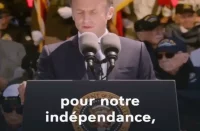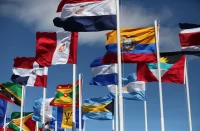It was supposed to come as a global surprise that NATO is ready to take part in the West’s new war, “to bring our contribution, if needed, in a clearly defined manner, to the broad international effort to protect the people of Libya from the violence of the Gaddafi regime”, as the alliance’s Secretary General Anders Fogh Rasmussen explained the objectives behind the mission. Just a couple of days ago it was not going to be there, but, you know, voices in favor of a resolute response are heard from everywhere, and Brussels is forced to accommodate the demand. For example, president of the Institute of the Middle East Yevgeni Satanovski, while admitting that the developments in Libya are best described as a mutiny and that Europe is being drawn into a serious armed conflict with no predictable outcome, still says that NATO, as the only organization having the necessary potential, will have to undertake an overland mission in Libya. Javier Solana, the European Union’s High Representative for Common Foreign and Security Policy under whose presidency NATO bombed Yugoslavia in 1999, also expressed the view – a privately held view, obviously – that NATO should spearhead the campaign in Libya.
The world is offered to buy the story that the countries which recently started hammering Libya were guided solely by their own enthusiasm, with no far-reaching plans for NATO involvement or NATO-supplied intelligence data on Gadhafi’s forces, their positions, and weaponry. Generally, a campaign of such proportions – but with no coordination between countries long integrated into NATO’s military planning and other activities and with cruise missiles targeting arbitrarily picked destinations – is an unlikely phenomenon. Rather, within days from now we will find ourselves watching a show with a storyline centered around the alliance which had no intention to step in but simply has to due to the tragic combination of circumstances. It had to be – and surely was – clear from the outset that the air raids launched by “individual” countries could at most stop Gadhafi’s onslaught and switch the conflict in Libya to the frozen mode. Rest assured, the NATO invasion of Libya had been planned before things started to happen, and we are about to see the plan materialize. Of course, Anglo-Saxons always attempt to make others shoulder the biggest part of the burden, but this time D. Cameron’s recent talks in Saudi Arabia showed that the strategy occasionally misfires as Saudi King Abdulaziz bluntly turned down the British partner’s invitation to hell.
D. Cameron is keenly interested in the war in Libya. Getting a piece of Libya’s oil pie occupies an important line on Great Britain’s agenda, plus the parliament – absent a serious military initiative – threatens to slash the budget of the Royal Air Force. Facing the parliament’s questions about the need to maintain the country’s military aircraft park at the current level, Cameron will be citing the risky anti-Gadhafi campaign as the justification and is ready to drag his country into a war to prove his point. The problem is that, now that the efforts to make others do the job have failed, Great Britain will have to take a real role in the fight. The British forces have a reputation for acting in line with the “There is no strength in numbers” principle, and quite possibly the British contribution to the rebel force in Libya will initially be limited to a battalion or so, but even that would no doubt be worth taking into account.
What really matters is that the moment any foreign soldiers land on Libya’s soil, the aggression against the country will become an irreversible process and the imminent escalation will be prompting increasing numbers of countries to get involved. Then the Anglo-Saxon and French proponents of “peace and democracy” will pay dearly for the campaign in North Africa.
Source: Strategic Culture Foundation














As a fact, this time it was not the Brits. Surprised? I bet so. No it wasn’t the Brits but the French who started the war in Libya. The Brits, Americans and Italians all had pretty big stakes in Libya but not the French. Total E&P was trying its best to bite into the Libyan cake for a long time but all it got was a small spoonful. So they’re really ticked off. Well, Mr. Sarkozy is married to Carla Bruni and she’s got him where she wants him. So Sarkozy starts the war and the rest of the gang have joined in.
@Gulam
I would not consider current French president as independent figure. He might has been receiving financing for his campaign not only from Gaddafi :)
The political center of the aggression is at the axis London-Washington anyway.